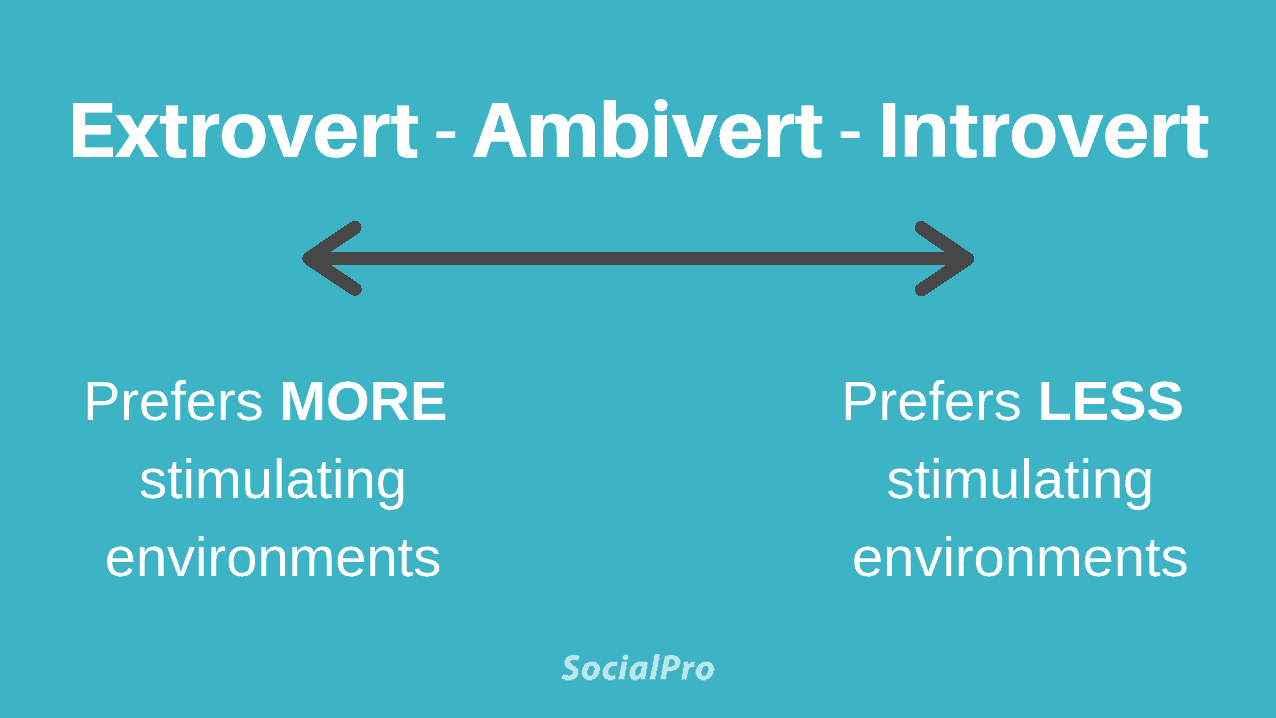“Can you force yourself to be an extrovert, and if so, how? I feel like my introversion holds me back from making friends, and extroverted people seem to have a lot more fun.”
Lots of social situations are easier for extroverts. But the good news is that it’s possible for an introvert to learn to be extroverted. This guide will show you how.
Sections
- What is an extrovert?
- How to be more extroverted
- Benefits of being more extroverted
- Common questions
What is an extrovert?
Extroverts are high in a personality trait called extroversion. Extroversion is made up of many facets, including sociability, assertiveness, and a willingness to take on leadership roles.[11] Psychologists measure this trait using psychometric tools such as the Big Five Personality Test.
Extroverts are enjoy social situations. They are outgoing, friendly, positive, and socially confident. Extroverts typically enjoy socializing in groups, and they are comfortable in busy, crowded places. They tend to focus on the people and things around them rather than their private thoughts and feelings.[11]
People who are low in extroversion are called introverts. Introverts are typically quieter, more inward-looking, and more reserved than extroverts. They enjoy socializing but often feel depleted or mentally drained after spending time with others, especially if they’ve been socializing in a group. Introverts need plenty of time alone to rest and recharge. They often prefer solitary hobbies and work well alone.[1]
How to be more extroverted
It’s important to remember that there’s nothing wrong with being introverted. It’s when introversion keeps you from doing what you really want to do or developing healthy relationships that it becomes a problem.
For example, if you are highly introverted and don’t want to make small talk with anyone, you might have difficulty getting to know your coworkers when you start a new job. This would be a problem if you wanted to make friends at work.
Here’s how to overcome introversion if you want to be more extroverted in social situations.
1. Make sure your introversion isn’t shyness
If you are an introvert, socializing drains your energy.[1] However, if you’re afraid of negative judgment, shyness (or social anxiety) might be the underlying cause. Read our guide on how to stop being shy if you think this might apply to you.
As a general rule, if you just prefer quiet environments and socializing with a small number of people and aren’t too worried about what others think of you, you’re probably an introvert.
2. Set yourself some specific, practical goals
In a study on personality change, the researchers discovered that setting behavioral goals can help you become more extroverted.[2] Make your goals specific. Setting a general intention like, “I’m going to be more outgoing and social” might not work.[3]
Here are some examples of how to set specific goals:
- “I’m going to talk to one stranger every day.”
- “If someone starts talking to me, I’m not going to give one-word answers. I’ll engage in conversation.”
- “I’m going to smile and nod at five people every day this week.”
- “I’m going to eat lunch with someone new this week at work.”
3. Have conversations with coworkers or classmates
Introverts tend to avoid small talk as it seems meaningless to them. But small talk has a purpose. It’s a warm-up for more interesting conversations.[4] Rather than discounting people who seem to enjoy small talk, try seeing it as an opportunity to connect.
If you start talking to ten people at work or in school, you might find that you have something in common with one or two of them. Try reading our guide on how to start a conversation.
4. Increase your social exposure gradually
Make it a policy to accept social invitations. But don’t say yes to everything at once because you may get social fatigue. Behaving in a more extroverted way can be draining if you’re naturally introverted, so try to plan regular downtime to recharge. Over time, your social stamina will increase, and you may become more outgoing.
Sometimes, people can find themselves feeling more introverted or extroverted than usual. This is true of both introverts and extroverts. It can depend on their circumstances. For example, an extrovert who has to be more social for work may want to be more socially introverted than usual.
Try looking at your lifestyle as a whole. Reducing social contact in one area can help you to crave it in another. A therapist can help support you along your journey and hold you accountable to realistic and achievable goals.
We recommend BetterHelp for online therapy, since they offer unlimited messaging and a weekly session, and are cheaper than going to a therapist's office.
Their plans start at $64 per week. If you use this link, you get 20% off your first month at BetterHelp + a $50 coupon valid for any SocialSelf course: Click here to learn more about BetterHelp.
(To receive your $50 SocialSelf coupon, sign up with our link. Then, email BetterHelp’s order confirmation to us to receive your personal code. You can use this code for any of our courses.)
5. Figure out what others are interested in
Socializing becomes more fun when you discover what people are interested in and if you have anything in common. Whenever you talk with someone about work or school, try asking something about what motivates them. For example:
- “What do you like the most about work?”
- “What do you dream of doing when you’re done with your studies?”
If they don’t seem enthusiastic about work or school, you could ask, “What do you like doing the most when you don’t work/study/etc.?” Change your mentality from “I wonder what this person thinks of me” to “I wonder what this person is interested in.”
Here’s our guide on how to make interesting conversation.
6. Mention things that interest you
Mention things you think the other person might also be interested in. This is a powerful strategy to get to what matters. As long as your interest isn’t too narrow, you might find something in common.
Someone: How was your weekend?
You: Good, I just finished reading Shantaram or I watched Cowspiracy about meat production or I met with a friend, and we talked about artificial intelligence, or I bought a bunch of probiotic food.
If they seem interested, continue the conversation. If they don’t, continue making small talk and mention another interest later.
7. Don’t define yourself by an introvert label
Introverts act like extroverts at times, and extroverts act like introverts at times.[5] Everyone is somewhere on this spectrum:

In addition, some people change their personality traits over time.[6] When we see that we don’t need to label ourselves, it gets easier to take on different roles. Lots of people worry that acting more extroverted means they are being fake. This isn’t true—it’s just about adapting to a situation.
8. Allow yourself to leave after 30 minutes
Accept invitations and show up. But take the pressure off of yourself by allowing yourself to leave after 30 minutes. If someone asks where you’re going, you can say, “I just wanted to swing by and say hi to everyone, but I need to get going.”
9. Be present in the moment
Introverts tend to spend a lot of time in their heads. When they socialize, they may end up thinking instead of listening. For example, during a conversation, an introvert might start having thoughts like, “I wonder what they’ll think of me?” “What should I say next?” or “Is my posture weird?” This can make them feel self-conscious and stiff.
If this sounds familiar, practice moving your attention out from your head to the topic. Practice being present in the moment and in the conversation. You’ll be a better listener, and it’s easier to add to a conversation and find mutual interests if you hear every word.
10. Avoid your phone when you’re around others
Do not spend time on your phone when you socialize. It might feel like a relief to disappear into the screen and use the phone as a distraction, but it signals to people that you’re not interested in talking.
11. Practice sharing about yourself
Don’t just ask questions. Share your own stories, thoughts, and feelings. As an introvert, sharing can feel unnecessary or too private. You might think, “Why would that be interesting to anyone else?” But opening up can make you more likable. People want to get to know who they talk to. They feel uncomfortable around someone they know nothing about.
Aim to speak roughly as much about yourself as others speak about themselves. Practice sharing your opinion on things. Mention what music you like, movies you didn’t like, or what your thoughts are on particular subjects. Avoid controversial topics until you know the other person well.
12. Try improv theatre
It’s common for introverts to be in their heads. Improv theater helps you out of your head because you have to be present in the moment. The idea of improv theatre is that you can spontaneously and instantly decide how to act based on the moment. Taking improv theatre classes can help you to be more expressive and spontaneous.
13. Find people who share your interests
Find clubs, groups, and meetups related to your interests. You’re more likely to find like-minded people there, and it’s more helpful to practice socializing in an environment you like. Try Meetup or Eventbrite for ideas, or check out the evening classes on offer at your local community college.
14. Take small steps outside your comfort zone
Doing outrageous things (like walking up to everyone you see and introducing yourself) doesn’t usually work. You won’t be able to keep it up for long because it will probably be too scary. And if you can’t keep it up, you won’t see a permanent improvement.
Instead, do something that’s slightly scary but not too frightening. Pick something you can do regularly. For example, stay a little longer in a conversation, even if you’re afraid you’ll run out of things to say. Say yes to a dinner invitation even if you don’t feel like it. When you’re more confident, you can challenge yourself by taking bigger steps.
In this article, you can get more tips on getting out of your comfort zone.
15. Practice being more energetic
If you feel low energy in social settings (or that people around you are often more energetic), it can be good to learn to raise your own energy level when needed. For example, it can be helpful to visualize yourself as an energetic person. How would that person act? How would it feel?
Another more hands-on approach is to experiment with different doses of coffee. Research shows that drinking coffee can give you more energy in social situations.[8] Here’s our guide on how to be more high-energy socially.
16. Take part in group conversations by listening
Group conversations can be difficult for introverts. You might feel that you never get to talk, you zone out, and you end up deep in thought instead of becoming involved in the conversation. But you don’t need to talk to be active in the conversation. It’s enough to look engaged, and people will include you.
React to what’s being said as though you were listening to the speaker in a one-on-one conversation. They’ll realize that you’re listening and start addressing you. Read more tips in this guide on how to be part of the group without saying anything smart.
17. Allow yourself to be passive at times
It’s easy to put pressure on yourself in social settings and to feel like you are “on stage.” But you don’t need to be active all the time when you socialize. You can take short breaks by just standing passively, not doing anything, and not interacting with anyone. You can do that for 1-2 minutes in a group, and no one will notice. When you’ve recharged a minute, you can start interacting again.
18. Host your own social gathering
If you find it easier to socialize in your own home, where you have more control, try inviting other people over for dinner or drinks. If it’s more important to you that you can escape easily if it gets too much, consider going out and preparing an excuse in advance if it gets too much. As your confidence builds, you’ll hopefully feel comfortable in a wider range of situations, but it’s perfectly OK to stay close to your comfort zone as you practice.
19. Learn by watching extroverts
Watching an outgoing, socially skilled person in their element can be helpful when you’re trying to become more extroverted. Observe their body language, facial expression, gestures, and the topics they tend to talk about. You may be able to pick up some useful tips.
For example, you might notice that one of your extroverted friends is quick to smile when they meet someone new rather than holding back to see whether the other person smiles first. If you do the same thing, you might put other people at ease.
Extroverted friends aren’t just useful as role models. They can also be wonderful ice-breakers in social situations. However, don’t let them take charge all of the time. Remember, you want to practice being extroverted, too.
For example, let’s say you’re going to a party with your extroverted friend. When you first arrive, you could hang out with your friend for a while until you’ve been introduced to a few new people. When you feel more comfortable, try having a few conversations with people one on one or in small groups while your friend is doing something else.
20. Focus on important situations
Trying to be more extroverted is going to cost you some energy. It’s worth focusing on the times that being extroverted will actually help you and making plans for those events. You can also plan time to recharge afterward. If you try to push yourself to be less introverted in all areas of your life at once, you run the risk of burning out.
Try making a list of the times when it’s most important that you are more extroverted, for example, during job interviews or networking events. You’re trying to find times when being more extroverted is going to make a big difference to how well you feel something went. Next to each item on the list, write down why being more extroverted will help and how it is going to make your life better.
For example, you might write: I want to be more extroverted when I’m at school. Why? Because then I can make a good impression on my professors and get a good reference. I’ll also make a better impression on my peers, who are good networking connections. How will that make my life better? I’ll get a better job, feel more successful, not have to worry about money, and I’ll have a great professional support network.
You can then remind yourself of why you’re trying to be more extroverted before those events to help you stay motivated and make it easier to make the changes you want.
21. Remember times when you were extroverted
You might never have considered yourself an extrovert, but there have probably been times when you were more extroverted than others. If you find yourself saying, “I can’t,” remind yourself of your most extroverted moments by saying, “I did it, and I can do it again.”
22. See extroverted behavior as part of your job
Even if you like your job, there are probably parts of it you don’t especially enjoy but need to do anyway. When you want to act more extroverted at work, it can help to reframe behaving in a more extroverted way as part of your role.
For example, if you want to be more outgoing during meetings, you could try telling yourself, “Speaking up and behaving like a confident person is just part of my job.”
23. Prepare topics to talk about before big events
It can be easier to talk to people and be more outgoing if you’ve prepared a few topics in advance. This is particularly useful at networking events. Read a few recent trade journals or articles so that you always have a subject to fall back on if the conversation dries up.
24. Don’t depend on alcohol for confidence
Alcohol can help you feel more outgoing and less inhibited. But relying on it in social situations isn’t a good long-term strategy because you can’t drink at every social occasion. It’s OK to have one or two drinks at a party or other special event, but don’t use alcohol as a crutch.
25. Read up on socializing for introverts
A top recommendation for introverts is to read Quiet by Susan Caine. Some of the advice in this guide is based on this book. For more great reading material, we have rankings and reviews on the best books for introverts.
The benefits of being more extroverted
If you are usually introverted, behaving in a more extroverted way can be a challenge. But research shows there are several benefits of being more extroverted, at least some of the time.
1. Being more extroverted can improve your well-being
In a 2020 study titled Experimental manipulation of extroverted and introverted behavior and its effects on well-being, 131 students were asked to act in an extroverted way for one week, then in a more introverted way for another week. Specifically, they were asked to be assertive, spontaneous, and talkative.
The results showed that the students reported a greater sense of general well-being after the extroverted week.[12] They felt more positive, more closely connected to the people around them, and more interested in everyday tasks.
2. Being more extroverted can help you make friends
Compared to introverts, extroverts tend to make friends more quickly.[13] This is partly because extroverts take the initiative in social situations. For example, an extrovert might be more likely than an introvert to smile at someone they don’t know or begin a conversation with a stranger.
As a result, extroverts get to know more people, which increases the odds that they will make friends. Extroverts come across as positive and friendly, which means people want to spend more time around them.
3. Being more extroverted can help your career
Because extroverts seek out social contact, they are more likely than introverts to build professional networks.[14] Making these connections can help your career. For example, if you are looking for a new job, tapping into your network can help you to find new opportunities.
Common questions about how to be more extroverted
Is introversion genetic?
Introversion is partly genetic, but it is also down to your environment and experiences. Studies suggest that genetics accounts for more than half of the difference in introversion within families,[8] possibly due to differences in brain responses to dopamine.[9]
Can you change from an introvert to an extrovert?
Changing from highly introverted to highly extroverted is rare, but you can learn how to stop being so introverted. Some people have introverted traits but have learned to act more like extroverts in social situations and can feel energized by these social events.
What causes an extrovert to become introverted?
Although extroversion is partly genetic, our brains and feelings change as a result of our experiences. Some introverted people become more extroverted as they become older, whilst some extroverts might move in the opposite direction.[10]
Can you force yourself to be an extrovert?
You can’t change your basic personality type. However, you can learn how to behave in a more extroverted way in social situations when it suits you.
















Loving the extrovert world is the only option for most of us and I am not okay with it. As I am an introvert I want to live my life according to my personality trait and I am kinda proud of it.
I love my solitude and I am not afraid to show it to the world. But the only thing that is bad about it I am actually happy in my own world
I would like to be more extrovert like my ex friends.. now I don’t have any friends because of my extreme introverted personality.. every friends of mine, not only friends olso my boyfriend friend think that I don’t care about anyone when I do.. but my less talking behavior make them think like this.. my friends had already left me , (all of them).. now I have one person and he also started loosening feelings for me.. now I’m feel like depressed…and alone…
I feel like I am a failure because I am so quiet and introverted. I can put it on when I need to, and seem really lively and friendly, but I fear that people can tell it’s fake because nobody seems to want to hang out with me anyway. I get so horribly lonely ever since me and the last dude I was with broke up, although clearly we weren’t amazing for each other, I felt like he understood me and accepted me although I was quiet. After that one of my other friends stopped talking to me because he said I was annoying and irritating and would always be alone. Now I am alone most of the time, which makes me sad and tired, but looking for new friends/going to parties/being extroverted is so much energy, especially when nobody seems to be interested in speaking to me anyway. I wish I could be outgoing like the other college students but it is just so hard for me and it’s like I don’t belong anywhere. I hate my personality. I wish I could just die and start over as a new person, a person that WORKS. You know? The world was made by extroverts, for extroverts.
I feel the same way I always feel that anything I say doesn’t make sense more especially when I come to sch I’m really quiet I can only seem to make friends with one girl in the entire university it’s so depressing just thinking about life
“I hate my personality. I wish I could just die and start over as a new person, a person that WORKS.”
YES! You put it into words flawlessly!
We should start a discord or something for everyone that can relate.
I would love to be more talkative in social situations where i am not surrounded by my close friends. Making small talk with strangers or people i’m not so familiar with is my biggest struggle. I would be so much happier if i could thrive in in social situations where hours of small talk is needed.
Thanks for sharing Daniel. There are so many people who feel just like what you describe that joined our free email course. I see you signed up today, welcome!